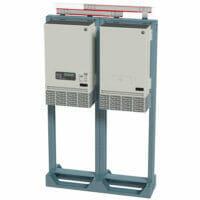
DC Power Plants: Efficient Power for Industry
For most of power infrastructure and transmission, the globe runs on alternating current (AC) power, but there are specific applications where Direct Current (DC) power is more efficient to use. We will explore DC power plants in more detail, why it is better for certain applications, and the industries where it is most commonly used.
In some respects, DC power is easy to understand. The polarity of the current never changes. Unlike AC current, one side of DC current is always negative and one is always positive. If you think of DC current like a water tank with a hose at one end, the water can only flow in one, constant direction to exit the hose. Like this example, DC current flows in one direction at a fairly consistent voltage over time.
DC power is often used in industries and applications that require a long duration discharge, or low amperage output over long periods of time. In fact, some types of high voltage DC transmission lines can move more power with less efficiency loss than AC transmission can. The efficiency of DC power can also save money over time in many industries by eliminating repeated inverter efficiency loss. For many facilities, the source of AC-powered electronic equipment is provided by the electric utility and is transmitted via Alternating Current. If conditioned by a UPS system, the UPS converts AC power to DC power to charge the batteries and power the inverter. The inverter then converts DC power back to AC power. This AC power supplies the load equipment, which in turn converts the power back to DC at the equipment’s power supply. This efficiency loss has driven some to look at distribution of critical power using DC.
For many industries, DC power is common, including telecom, where the traditional DC power plant is used.

The telecom industry is one of the industries where DC power is most advantageous. The equipment in this industry, such as wireless connections, network access points, and data center co-location equipment require consistent, efficient power for as long a duration as possible. For telecom applications, many of these sites are remote and are not supported by an emergency backup generator. Many DC power plants in this industry are designed for small spaces and are often modular in design. They typically have front access batteries that can easily be mounted in either an open rack, or in a cabinet to save space.
As advantageous as DC power is, it must be well maintained. Though DC power plants are reliable, proper maintenance is critical for long term success. Batteries degrade over time and should be maintained, tested and replaced at appropriate intervals. Most DC power plants use VRLA and Wet Cell battery technology. Even though these batteries are well designed, they can only last between 5 and 15 years, and this is under ideal conditions. Many circumstances can degrade battery integrity more quickly, such as:
- Not performing regular preventative maintenance measures
- Original design quality of the DC plant batteries installed
- Proper charging and float current
- The application in which the battery is being used (industrial power, life safety equipment, etc.)
- The environment the power is provided in (clean, climate controlled, well managed, etc.)

DC power plants are different than a UPS system and should be installed and maintained by a qualified technician that is well trained and has the proper tools.
Can’t decide what DC power plant is right for you? Contact QPS for a site survey of your environment. We can walk you through DC power plant maintenance, design and installation and can help evaluate your critical power quality infrastructure. QPS will help you design the right solution for your space.
Published on May 02 2018
Last Updated on Dec 08 2022

